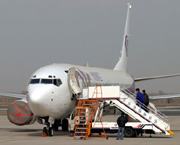|
 |
| Ground service check the Boeing 737-900 of Okay
Airways on March 10, 2005. (newsphoto) |
China's first private airline is scheduled to operate its maiden flight
today, a landmark move that will break the government monopoly in the
civil aviation sector.
The first passenger flight of Okay Airways is due to take off at 9:00am
from Binhai International Airport in Tianjin - where it is based - then
fly to Changsha in Central China en route for Kunming in Southwest China's
Yunnan Province.
The aircraft being used is a 189-seat Boeing 737-900 leased from Korea
Airlines.
Sui Guangming, the new company's executive
president, will be captain
on the first flight.
The firm planned to begin operating last Saturday but was unable to do
so as the necessary paperwork from the General Administration of Civil
Aviation of China (CAAC) was late arriving, said the company's president
Liu Jieyin.
A ticket between Tianjin and Kunming on the first
flight is 680 yuan (US$82) after a 40 per cent discount
, a Tianjin-based travel agency told
China Daily.
The ticket price for the trip between Tianjin and Changsha is usually
1,180 yuan (US$143), but just 710 yuan (US$86) on the first flight, the
agency added.
The route is only operated by Okay Airways.
The airline, funded by private investors from Beijing and Shenzhen in
South China's Guangdong Province, has a registered capital of 300 million
yuan (US$36 million).
It is committed to a low-cost strategy to engage in air cargo and
express services plus passenger charter and ground distribution services.
The CAAC has also given the nod to three other private investors to set
up airlines.
They are the Shanghai-based Spring International Airlines, the
Chengdu-based Eagle Airlines and Huaxia Airlines in Gansu Province. It has
been reported that Eagle Airlines will begin operating in June.
All three are said to be planning on having low costs to build a budget
airline.
Okay Airways is taking off two weeks after the State Council released a
new policy paper on "encouraging, supporting and guiding the development
of the non-State sector."
Market competition will be further introduced in previously State
monopolized sectors such as power supplies, telecommunications, railways,
civil aviation and petroleum, the document said.
The document lowers the threshold for private businesses to enter
sectors the State previously monopolized and grants them equal status to
obtain financial resources.
It also promises to provide private businesses with comprehensive
services and protect their legal rights and interests.
Insiders hailed the document as the nation's policy support for private
businesses, especially concerning market access and financing.
The growth of private businesses is still being held back after two
decades of market-orientated reform.
The new airlines will face challenges from international counterparts
as some foreign low-cost carriers have an eye on China's aviation sector.
(China Daily) | 